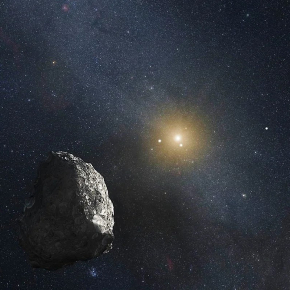Extent of CO2 and CO ice in the trans-Neptunian region revealed by JWST
Trans-Neptunian Objects (TNOs) are the small, primitive bodies of our outer Solar System, orbiting beyond Neptune. Formed quite far from the Sun, these objects are still brimming with information about their formation over 4 billion years ago, unlike dwarf planets like Pluto, which may have undergone major internal evolution. OTNs have also witnessed planetary migration processes that have, for the most part, redistributed them far from their region of formation. Until now, observations of OTNs have been limited, providing a very partial characterization of their chemical composition: only water and methanol ices have been detected on a handful of objects.
A major observing program1 by the James Webb Space Telescope recently provided the first comprehensive view of OTNs. Observations of 59 objects obtained with the NIRSpec instrument have been analyzed by an international research team involving scientists from CNRS Terre & Univers (see box). The infrared spectra reveal the very first detections of CO2 and CO ices on small bodies in the outer Solar System.
Against all expectations, CO2 is widespread, present on 95% of objects in varying proportions. While CO is not stable in the trans-Neptunian region, it is detected together with CO2 on 47% of objects. This diversity of composition, reflected in variations in the abundance and physico-chemical state of the ice, will enable us to retrace the history of the OTNs to find their place of formation in the protoplanetary disk. While CO2 may have been inherited from the protoplanetary disk, CO is more likely to have been formed by surface interaction with solar wind and cosmic rays. Remarkably, 13CO2 was also detected, opening up the possibility of studying carbon isotope ratios across the outer solar system.
De Prá, M.N., Hénault, E., Pinilla-Alonso, N. et al. Widespread CO2 and CO ices in the trans-Neptunian population revealed by JWST/DiSCo-TNOs. Nat Astron (2024).
This study involved Aurélie Guilbert-Lepoutre
